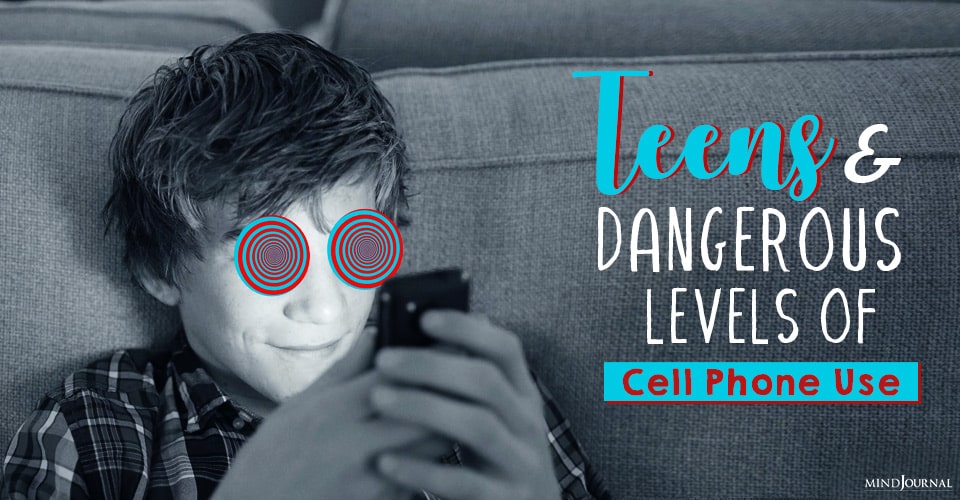My inbox has been inundated with reports that our teens are literally dying because of excessive cell phone use. From an editorial in the Lancet to my local radio station, the news is alarming. In many cases, I’m told, our children are on their phones eight or more hours a day, with experts saying it should be limited to just two.
Jean Twenge’s new book iGen has been front and center, insisting that we do something and do it quickly. Kids are using their cell phones way too much and putting their mental health at terrible risk. National surveys are showing that kids today are more anxious than ever before, with spiking rates of depression and suicide.

Twenge suspects that this uptick in problems (which every mental health professional knows is happening) occurred at just about the same time as cell phones became a common accessory for most teens. Correlation doesn’t imply causation, but in this case, one has to wonder if the very real increase in emergency room visits for mood disorders and self-reported anxiety among teens isn’t a byproduct of more accessible technology that both connects and isolates at the same time.
There is definitely something addictive about the ping of a text and the scrolling counter telling us how much others “like” us. It’s made us all (children and adults) into gamblers, sitting in our bedrooms just like slots players sit in windowless casinos, forgetting the time of day, addicted to the next spin and the possibilities it brings.
There’s more bad news too. Seems that with all that online addiction is also coming more bullying, which is only fueling kids’ anxiety. A recent article in the Canadian Medical Association Journal by a group of researchers based mostly in Quebec, Canada, found that among a large sample of teens, 59% reported moderate exposure to bullying, and 14% reported chronically high exposure to bullying, both in-person and online. That’s not a trend or a disease. At those rates, children’s experiences of bullying are almost as common as high school graduation.
If all of this has made you depressed as a parent, it’s time to think about what you (and others) can do to put the brakes on this spiraling chaos.
Here’s A Few Solutions That Have Made Recent Headlines.
First, start with the corporations.
They have to provide us with the tools as families so that if we want to, we can limit our children’s (and our own) access to our cell phones. I’ve been reading a lot about the California State Teachers’ Retirement System that is huge investor in Apple and their petition to force the company to do something to protect kids from the potential harms of overuse.
I applaud this initiative but only up to a point. I’m sure smartphone producers could find a way to build into their operating systems a simple password that anyone (even teens themselves) could type in that would lock the phone after a set number of hours each day, except for incoming and outgoing texts/calls with caregivers. It could help prevent cell phones from peddling “likes”, the online equivalent of crack.
The problem with such a solution is that it won’t work. Young people will simply migrate to new platforms and new devices to communicate. Hackers will find ways to unlock locks. Bullies will keep on bullying. Corporate social responsibility can only ever be one tool among many.
Related: How Smartphones and Social Comparison are Making Us Unhappy?
Second, let’s talk about our communities.
If you look for good news about kids these days, we can find it, but we likely have to look beyond North American suburbs. There is, for example, the success Iceland has experienced in tackling worrying trends among teens with regard to delinquency, drugs, and alcohol abuse.
An American professor of psychology, Harvey Milkman who teaches part of each year at Reykjavik University, showed during his dissertation two decades ago that drugs and alcohol give children’s brains different types of stimuli depending on the child’s biology.
Children who want a rush, Milkman argued, are going to find that through substance abuse or shoplifting or violence. Children who are anxious are going to use substances (like alcohol) to calm themselves down and lose the inhibitions that are a consequence of their anxiety.
The brilliance of what Iceland implemented was a nationwide effort to substitute natural highs and other ways of changing brain chemistry through real experiences that could compete with the synthetic highs found in drugs (and maybe even cellphones).
It worked in Iceland. From 1998 to 2016 the rate of teens who reported being drunk in the past month dropped from 42 percent to 5 percent. Cannabis use dropped from 17 percent to 7 percent, and cigarette use declined from 23 percent to 3 percent. Much of this change is attributed to providing young people with lots and lots (and lots) of opportunities to stay engaged with each other, to participate in arts and sports activities, and to have safe spaces after school to hang out.
The entire system is incentivized with subsidies and tax breaks for parents. While there is no word on whether these programs are being threatened by cell phone use (do heavy cell phone users avoid the programs?) it would appear that at least part of the solution to our children’s cell phone addiction is to offer them equally stimulating and socially engaging opportunities to do things that produce the same brain rewards as eight hours staring at a small blue screen.
Related: Why You’re Addicted To Your Phone And How To Fix It
Third, how about we rethink smartphones at school?
I was just in the UK and many of their educational institutions don’t allow phones in the classroom. I used to think that phones could be a great teaching aid, empowering students to access information and mental health supports and to connect with global issues, but I’m rethinking my position on that as cell phone use gets completely out of control. Too much of a good thing, like chocolate, has its downsides.
Maybe it’s time schools created cell-free zones, just as many corporations have done the same so workers are less distracted by constant interruptions. Of course, the inevitable parent will complain about the inability to reach their child at a moment’s notice. Maybe it’s time schools spoke back to these overprotective parents, pointing out that they are harming their children and threatening their psychosocial development. On this issue, we know the harm is real.
Fourth, and finally, as parents we have to exercise our ability to influence our kids.
As a parent to five children, I know it’s tough to do, but it is possible. Let’s be clear, in most households it’s the adults buying their children the devices and giving them all the access the kids want.
We let them take their devices to bed. We pay for the data packages. We buy the games or top up their accounts. We basically buy them bags of crack and then say, “Please, self-regulate.” Before we beat up on Apple for designing these wicked devices, maybe we as parents have to put the brakes on financing our kids’ addictions in the first place.
Over the years, as I’ve studied resilience, I’ve been reminded by children over and over again that they actually appreciate structure and reasonable consequences. They like routines and expectations that they can meet. They want genuine attachments and large networks of social relations. And like those kids in Iceland, they want opportunities to show others their talents, to be pushed out of their comfort zones and try new things, to be active physically and intellectually. These are all things we, as parents, have stopped providing our kids.
I’ll admit, I’m not immune to the problems. It worries me when I see my 14-year-old stepson, head crooked forward, sitting on the couch tuned into his smartphone. But then he is an elite-level hockey player and has a large and active network of friends as well. So I stuff my feelings and don’t say too much. But it nags at me nonetheless.
All those hours doing nothing when there are great books to read and skills to learn. He never builds anything. He never reads a novel. He never talks about the world he is experiencing. Except when we travel, and the phone is turned off.
His childhood makes me sad, but then, he is only on his phone a paltry 2-3 hours a day. I can only imagine the disappointment a parent feels watching her child waste even more time waiting for the next Instagram message to appear or desperate for the next “like” on Facebook.
Strategies For Parents To Help Children Reduce Cellphone Use
How about we as parents try some new strategies:
1. Model appropriate cell phone use.
Start with what we can do. Leave our cell phones at the door. Turn them off at mealtime. Don’t harass our kids with endless texts checking upon them. If we model restraint, maybe our kids will see it’s possible.
2. Limit access.
Stop paying for the darn phones. If your child is addicted, cut them off. A simple rule I hold to is that in general, when a child can afford a device they are likely responsible enough to have it. Let your child buy their own phone, their own data package, their own gaming systems.
Hold back from giving them everything they think they need to be like every other kid and let them feel that lovely self-esteem boost of knowing “I’m a little different” which could also translate into “I’m unique”. The way I see it, if they’re motivated to find work, and get themselves online, then they’re less likely to have the time to become addicted to their phone.
3. Set routines and structure.
No cell phone use at bedtime. Turn the phone off and put it away. Any addiction that triggers a change in brain functioning is going to be difficult to control as long as it’s there at hand ready to light up our neural pathways.
As parents, our job isn’t meant to be easy. It’s meant to prepare children for life and that means telling them “No” when really, deep down, that’s what they want to hear anyway.
Related: 6 Snapchat Safety Tips To Teach Your Kids
4. Offer substitutes.
Create opportunities for kids to keep busy. Give them chores and real responsibilities that matter to the family. Planning a winter vacation and they’re coming along? Any 14-year-old with good net surfing skills can find a hotel on a beach, or scope out activities to do off-site at the all-inclusive.
Let’s stop making our children’s lives so easy and in the process offer them real diversions. Insist they are active an hour a day. Put them into activities and take away their cell phone. Oh, there will be histrionics, but the end result will likely be a happier, more engaged child with the life skills and habits that will make them healthier more successful adults.
It’s worth a try, isn’t it?
Written by: Michael Ungar Originally appeared on: Psychology Today Republished with permission










Leave a Reply